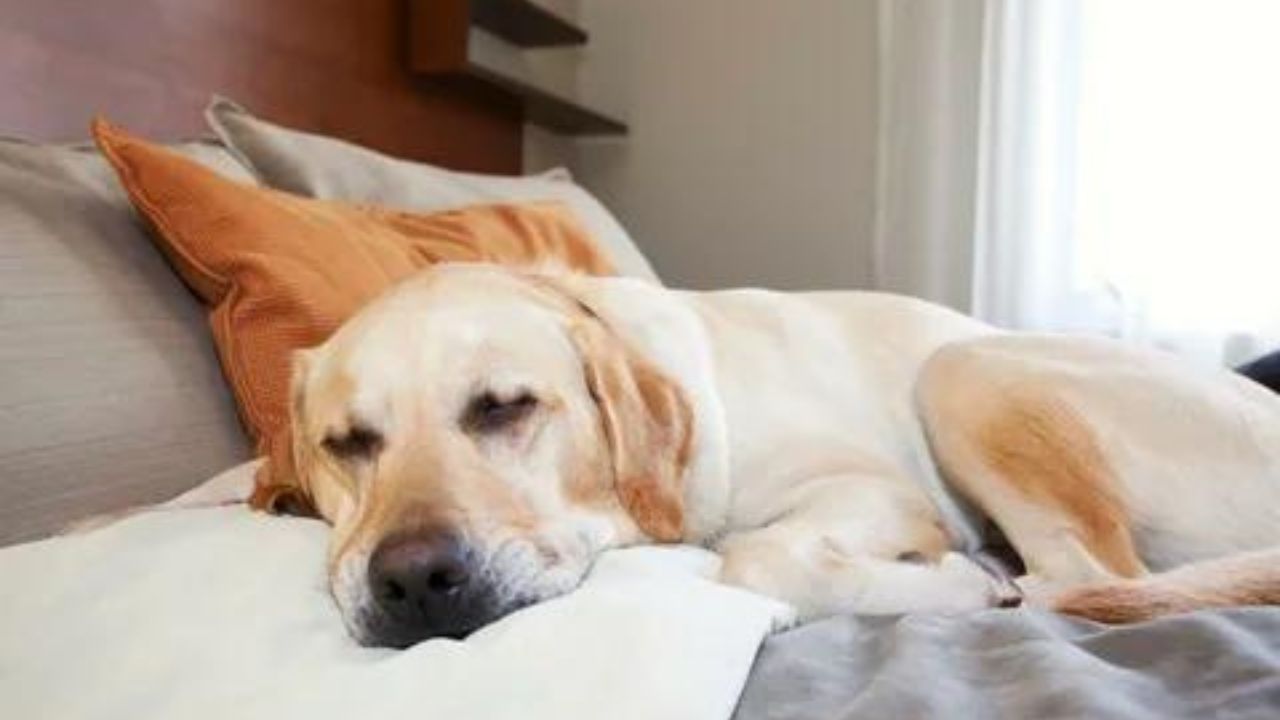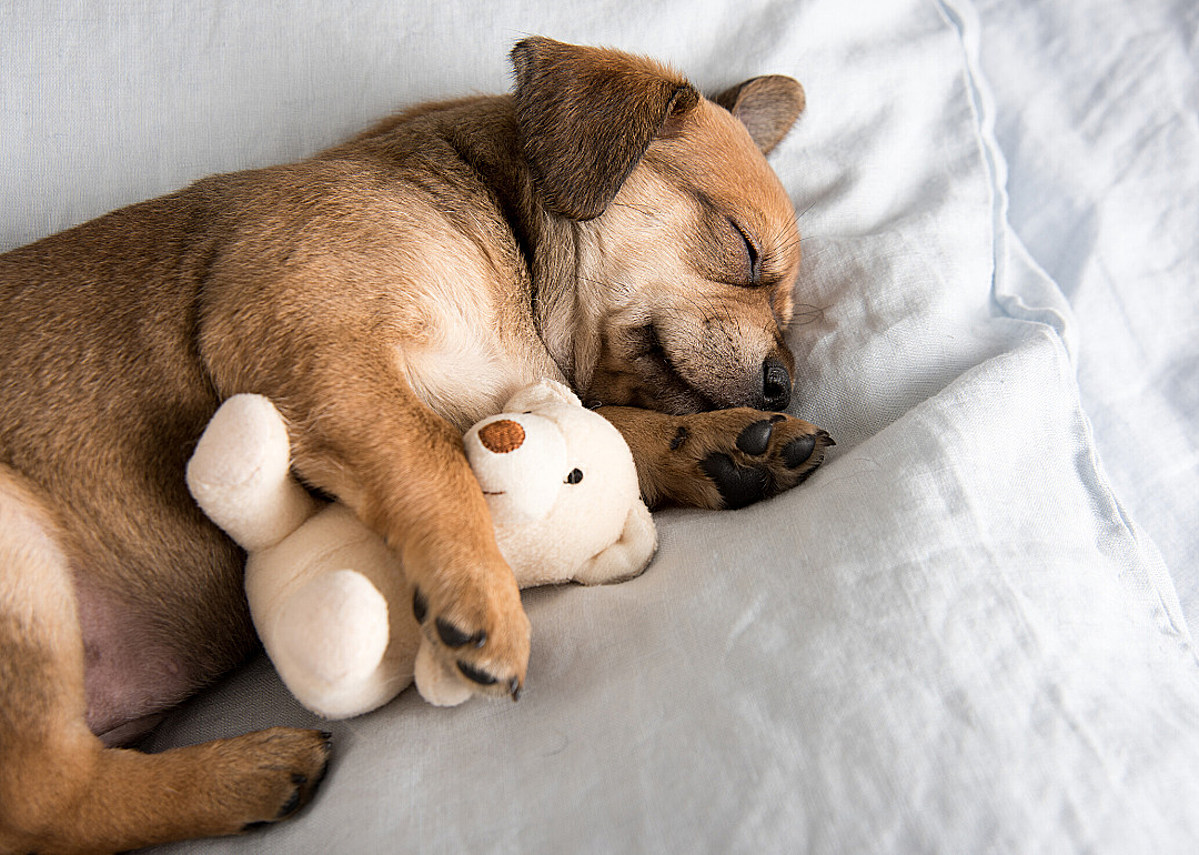
Ah, puppies! Who doesn’t love them? With their adorable wagging tails and playful antics, they’re practically guaranteed to brighten up your day. But have you ever noticed why puppies breathe fast at sleep? It’s almost like they’re running a marathon in their dreams! As it turns out, there’s a fascinating explanation behind this behavior.
This article will explore why puppies breathe so fast when they sleep. We’ll dive into the normal breathing patterns of puppies and how they differ from those of adult dogs. We’ll also discuss the impact of factors like breed, size, and growth on a puppy’s breathing rate. And, of course, we’ll cover the potential health issues that can arise if your puppy’s breathing is too rapid.
So, this article is for you whether you’re a new puppy owner or a seasoned pro. Get ready to learn why your furry friend is panting up a storm in their sleep – and to have some fun while doing it! Continue Reading…
Normal Breathing Patterns in Puppies
As an experienced dog owner knows, a dog’s breathing patterns can vary depending on age, breed, and activity level. Puppies, in particular, tend to have unique breathing patterns that differ from those of adult dogs.
Regarding normal breathing patterns in puppies, it’s important to remember that they breathe faster than adult dogs. According to the American kennel club, puppies can breathe up to 40-50 times per minute while at rest, compared to 10-30 times per minute for adult dogs. This is partly because puppies have the smaller lung capacity and higher metabolic rates than adult dogs.
It’s also important to note that puppies tend to breathe differently when sleeping compared to when awake. While awake, puppies tend to pant more frequently and take shorter breaths. This is because panting helps regulate a puppy’s body temperature and cool them down. However, puppies tend to take longer, deeper breaths when sleeping. This is because their bodies are in a more relaxed state, and they require less oxygen.
Of course, it’s always important to keep an eye on your puppy’s breathing patterns and note any changes that could cause concern. If your puppy is breathing heavily or seems to be struggling to breathe, it’s best to consult with a veterinarian as soon as possible.
By understanding the normal breathing patterns of puppies, you can gain a better sense of what to expect from your furry friend. And who knows – you might impress your friends with your newfound knowledge of puppy breathing!
Why is my Puppy Breathe Fast in its Sleep?
If you’ve ever watched your puppy sleep and noticed that their breathing seems fast and shallow, you might wonder what’s happening. Don’t worry – in most cases, fast breathing during sleep is completely normal for puppies.
As mentioned earlier, puppies tend to breathe faster than adult dogs due to their smaller lung capacity and higher metabolic rates. This is true whether they’re awake or asleep. However, there are a few other factors that can contribute to your puppy’s fast breathing during sleep:
- Dreams: Like humans, dogs dream while they sleep. It’s possible that your puppy’s fast breathing is a result of an exciting or stressful dream.
- Growth and development: As we discussed earlier, puppies require more oxygen to support their growth and development. This can lead to faster breathing rates, particularly when they’re sleeping.
- Temperature regulation: When dogs pant, it helps them regulate their body temperature. While puppies tend to pant less frequently while sleeping, they may still use rapid breathing to regulate their body temperature.
In some cases, rapid breathing during sleep can signify a more serious health issue, such as respiratory distress or heart problems. If you’re concerned about your puppy’s breathing rate or notice any other concerning symptoms, it’s always best to consult with a veterinarian.
In general, though, fast breathing during sleep is a normal part of puppyhood. As your puppy grows and develops, their respiratory system will continue to mature, and its breathing rate will likely slow down. So, let your furry friend dream away – they’re just getting some well-deserved rest after a long day of play!
How do you Test your Puppy’s Breathing Rate?
Monitoring your puppy’s breathing rate is important to maintaining their health and well-being. But how do you go about testing their breathing rate?
One of the simplest ways to test your puppy’s breathing rate is to observe them while sleeping. Puppies tend to breathe faster when asleep, so this is a good time to get a sense of their normal breathing patterns. Watch your puppy’s chest to see how many breaths they take per minute, and note whether they seem to be breathing heavily or struggling to breathe.
Another method for testing your puppy’s breathing rate is to take their respiratory rate when they’re awake. To do this, count the number of breaths your puppy takes in a minute. You can do this by placing your hand on their chest or by watching their chest rise and fall.
If you’re having trouble getting an accurate count of your puppy’s respiratory rate, you can also use a stethoscope. Place the stethoscope on your puppy’s chest and listen for its breathing rate. This can help you get a more precise measurement of their respiratory rate and identify any abnormalities.
It’s important to remember that a puppy’s respiratory rate can vary depending on factors like breed, age, and activity level. Generally, a healthy puppy should breathe 15-40 times per minute while resting. If you notice any changes in your puppy’s breathing rate or pattern, it’s best to consult a veterinarian.
By regularly testing your puppy’s breathing rate, you can ensure that they’re healthy and happy. And who knows – you might even become a pro at counting puppy breaths!
The Relationship Between Puppy Growth and Breathing Rate
As your puppy grows, you may notice changes in its breathing rate during sleep. This is because a puppy’s growth can significantly impact its respiratory system and overall health.
During the first few weeks of life, puppies are still developing their respiratory systems. Their lungs are small, and they can’t breathe as much air as adult dogs. As a result, puppies breathe faster and shallower than adult dogs.
As puppies grow and develop, their lung capacity increases and their breathing rate slows down. However, it’s important to note that this process can vary depending on the breed and size of your puppy. Larger breeds, for example, tend to have slower respiratory rates than smaller breeds.
In addition to lung capacity, a puppy’s metabolism affects its breathing rate. Puppies have higher metabolic rates than adult dogs, requiring more oxygen to support their growth and development. This can lead to faster breathing rates, mainly when they’re sleeping.
It’s important to monitor your puppy’s breathing rate and note any changes that could cause concern. Rapid breathing or panting can signify respiratory distress or other health issues. If you notice any changes in your puppy’s breathing patterns, it’s best to consult a veterinarian.
By understanding the relationship between puppy growth and breathing rate, you can better understand what to expect as your furry friend grows and develops. And who knows – you might even impress your veterinarian with your knowledge of puppy respiratory systems!
The Impact of Breed and Size on Breathing Rate
Did you know that a puppy’s breed and size can significantly affect its breathing rate? It’s true! Different breeds and sizes of puppies have unique respiratory systems that can impact their breathing patterns.
For example, brachycephalic breeds (breeds with short snouts) like bulldogs, pugs, and boxers are known for having higher respiratory rates than other breeds. This is because their airways are narrower, and they have more difficulty taking in air. As a result, they tend to pant and breathe more rapidly, particularly when they’re excited or active.
On the other hand, breeds with longer snouts, like greyhounds, collies, and German shepherds, tend to have slower respiratory rates. This is because their airways are wider, and they can breathe more air with each breath. These breeds also tend to have larger lung capacity than brachycephalic breeds.
In addition to the breed, the size of your puppy can also impact its breathing rate. Smaller breeds, like Chihuahuas and Toy Poodles, tend to have faster respiratory rates than larger breeds, like Great Danes and Mastiffs. This is because smaller dogs have smaller lung capacity and higher metabolic rates.
It’s important to note that while breed and size can play a role in a puppy’s breathing rate, there are always exceptions. Every puppy is unique and may have a respiratory system that differs from what’s typical for its breed or size.
By understanding the impact of breed and size on breathing rate, you can better understand what to expect from your furry friend. And who knows – you might even impress your fellow dog owners with your knowledge of different breeds and their respiratory systems!
Potential Health Issues Related to Rapid Breathing in Puppies
While it’s normal for puppies to breathe faster when sleeping, rapid breathing or panting can signify respiratory distress or other health issues. It’s important to monitor your puppy’s breathing rate and note any changes that could cause concern.
One potential health issue related to rapid breathing in puppies is pneumonia. Pneumonia is an infection in the lungs that can cause breathing difficulties and rapid, shallow breathing. Puppies with weakened immune systems are particularly susceptible to pneumonia, which can be life-threatening if left untreated.
Another potential health issue is heart disease. Congenital heart defects can cause rapid breathing as the heart struggles to pump blood efficiently. Puppies with heart disease may also exhibit other symptoms, such as lethargy, coughing, and difficulty exercising.
In addition, rapid breathing can be a sign of heatstroke. Puppies are more susceptible to heatstroke than adult dogs, as they struggle to regulate their body temperature. If your puppy is panting heavily, appears lethargic, and has a high body temperature, it may be experiencing heatstroke and require immediate veterinary attention.
Other potential causes of rapid breathing in puppies include allergic reactions, respiratory infections, and other health issues. If you notice any changes in your puppy’s breathing patterns, it’s important to consult with a veterinarian to determine the underlying cause.
By understanding the potential health issues related to rapid breathing in puppies, you can keep an eye out for any concerning symptoms and seek veterinary attention if necessary. And who knows – your knowledge of puppy health issues could even help save a furry friend’s life!
When Should you be Concerned?
While it’s normal for puppies to breathe quickly and deeply while sleeping, certain signs could indicate a more serious problem. Here are some things to look out for:
- Labored breathing: If your puppy seems to be breathing with great effort or making unusual sounds (such as wheezing or rasping), this could indicate an issue with their respiratory system.
- Rapid breathing while awake: While puppies tend to breathe faster than adult dogs if your puppy is breathing rapidly while awake and at rest, this could be a sign of an underlying health problem.
- Bluish or pale gums: If your puppy’s gums appear bluish or pale, this could indicate a lack of oxygen and a serious respiratory issue.
- Lethargy or decreased activity: If your puppy seems unusually tired or less active than usual, this could indicate an underlying health problem.
- Coughing or sneezing: If your puppy is coughing or sneezing frequently, this could be a sign of an upper respiratory infection or other health problem.
If you notice any of these symptoms in your puppy, you must consult a veterinarian immediately. While some breathing issues in puppies are relatively minor and can be easily treated, others can be more serious and require prompt medical attention.
The key is to keep a close eye on your puppy’s breathing patterns and note any changes that could cause concern. With a little vigilance and help from your vet, you can keep your furry friend healthy and happy for years.
How to Control Breath Rate
While it’s normal for puppies to breathe quickly, there are certain things you can do to help regulate their breathing rate and keep them comfortable. Here are a few tips on how to control your puppy’s breath rate:
Create a comfortable sleeping environment
Puppies tend to breathe more rapidly when they’re feeling anxious or uncomfortable. Make sure your puppy has a cozy, safe space to sleep in, with a comfortable bed and plenty of toys to keep them occupied. This will help your puppy feel calm and relaxed and may result in a slower, more regular breathing rate.
Monitor your puppy’s activity level
Like adult dogs, the more active your puppy is, the faster it’ll breathe. While giving your puppy plenty of exercises, it’s also important to ensure they’re not overexerting themselves. Ensure your puppy takes frequent breaks during playtime and gets plenty of rest.
Be mindful of the weather
Hot or humid weather can cause your puppy to pant more frequently, leading to a faster breathing rate. Ensure your puppy has access to cool, fresh water, and avoid exercising during the hottest parts of the day.
Provide plenty of mental stimulation
Puppies tend to breathe more rapidly when they’re bored or under-stimulated. Make sure your puppy has plenty of toys and puzzles to keep them occupied and spend time playing with them throughout the day.
Remember, every puppy is different, and what works for one may not work for another. If you’re concerned about your puppy’s breathing rate, it’s always best to consult a veterinarian. They can help determine if any underlying health issues could contribute to your puppy’s breathing rate and provide guidance on keeping your furry friend healthy and happy.
Conclusion
In conclusion, puppies breathe fast during sleep as part of their normal respiratory patterns. Still, rapid breathing or panting outside of sleep can signify respiratory distress or other health issues. It’s important to monitor your puppy’s breathing rate and note any changes, as these could be indicators of potential health problems.
Caring for a puppy requires a lot of attention and dedication, and monitoring their breathing patterns is just one aspect of their care. By staying informed about your puppy’s health and well-being, you can help them live a happy, healthy life as a beloved family member.








